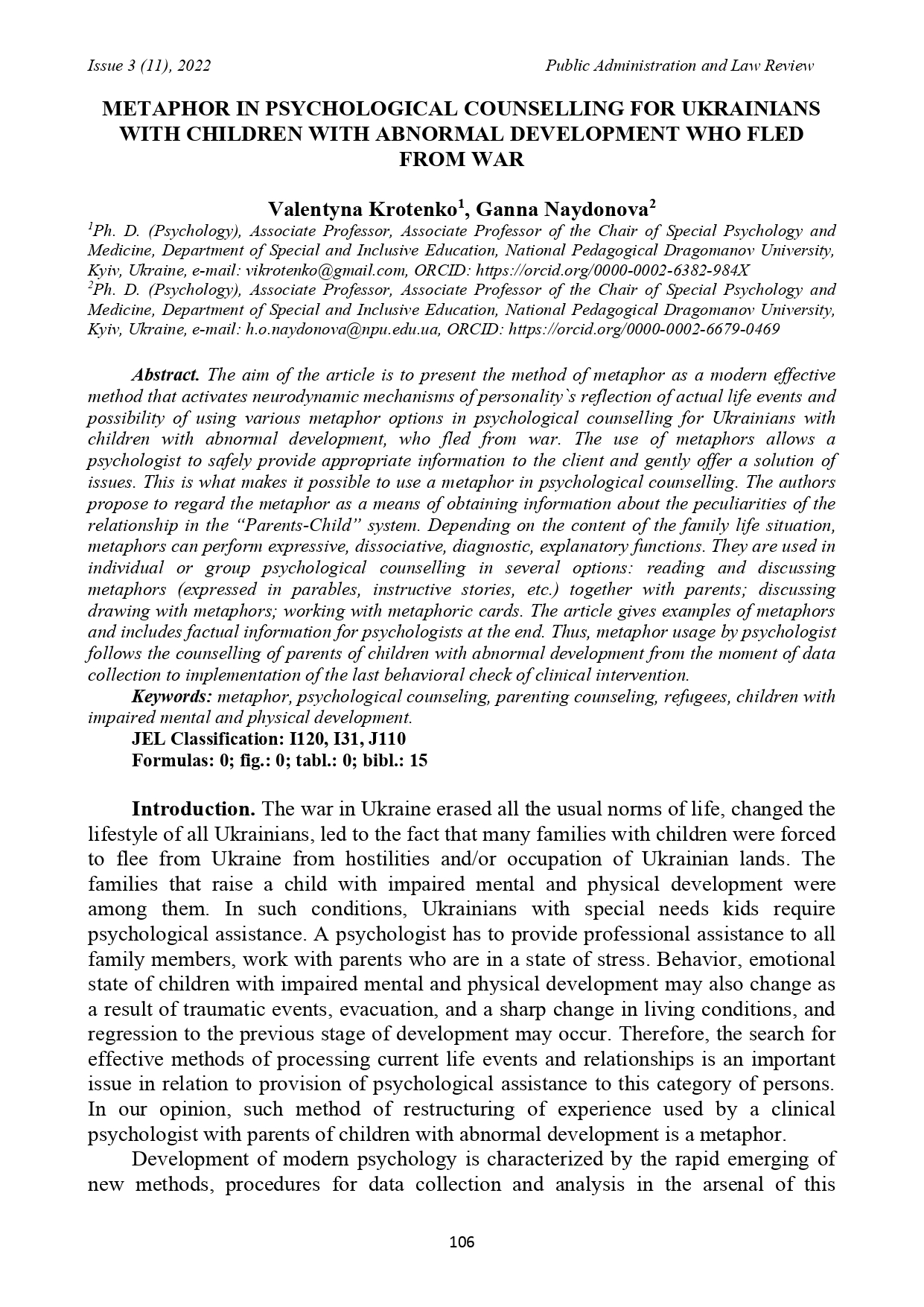METAPHOR IN PSYCHOLOGICAL COUNSELLING FOR UKRAINIANS WITH CHILDREN WITH ABNORMAL DEVELOPMENT, WHO FLED FROM WAR
DOI:
https://doi.org/10.36690/2674-5216-2022-3-106Keywords:
metaphor, psychological counseling, parenting counseling, refugees, children with impaired mental and physical developmentAbstract
The aim of the article is to present the method of metaphor as a modern effective method that activates neurodynamic mechanisms of personality`s reflection of actual life events and possibility of using various metaphor options in psychological counselling for Ukrainians with children with abnormal development, who fled from war.
The use of metaphors allows a psychologist to safely provide appropriate information to the client and gently offer a solution of issues. This is what makes it possible to use a metaphor in psychological counselling. The authors propose to regard the metaphor as a means of obtaining information about the peculiarities of the relationship in the “Parents-Child” system. Depending on the content of the family life situation, metaphors can perform expressive, dissociative, diagnostic, explanatory functions. They are used in individual or group psychological counselling in several options: reading and discussing metaphors (expressed in parables, instructive stories, etc.) together with parents; discussing drawing with metaphors; working with metaphoric cards. The article gives examples of metaphors and includes factual information for psychologists at the end. Thus, metaphor usage by psychologist follows the counselling of parents of children with abnormal development from the moment of data collection to implementation of the last behavioral check of clinical intervention.
Downloads
References
Alekseev, K.I. (1996). Metafora kak obiekt issledovaniya v psihologii i filosofii. [Metaphor as an object of research in psychology and philosophy] Voprosy psikhologii [The Issues Relevant to Psychology]. 2, 73–85.
Arutyunova, N. D. & Zhurinskaya, M. A. (Eds.) (1990). Teoriya metafory [Theory of metaphor]: Sbornik / Per. s ang., fr., nem., isp., pol'sk. yaz. / Vstup. st. i sost. N. D. Arutyunovoj. Moscow: Progress.
Bogdanovich, V. N. (2006) Istoriya i metafory v pomoshch' vedushchemu treninga. [History and metaphors to help the facilitator] Saint-Petersburg: Rech'.
Byuler, K. (1993). Teoriya yazyka: reprezentativnaya funkciya yazyka [Language theory: the representative function of language] Moscow: Progress.
Erickson, Milton & Rossi, Ernest (1977). Autohypnotic Experiences of Milton H. Erickson. The American Journal of Clinical Hypnosis, July. 20, 36–54.
Erikson, M. G.& Rossi, E. L. (2001). Chelovek iz fevralya: gipnoterapiya i razvitie samosoznaniya lichnosti [The man from February: hypnotherapy and the development of personality self-awareness]. Moscow: Klass.
Ferrari F. The «transformative» power of «integrated metaphor» in counselling. Metaphor and the Social World. Vol. 10, Issue 2, 2020. P. 292–319. https://doi.org/10.1075/msw.00008.fer
Gordon, D. (1995). Terapevticheskie metafory. [Therapeutic metaphors] Saint-Petersburg, Belyj krolik.
Hordieieva, Zh.V. (2009). Metodoloho-psykholohichni zasady vykorystannia metafory yakzasobu rozvytku samosvidomosti osobystosti. [Methodological and psychological principles of using metaphor as a means of developing personal self-awareness]. Naukovi zapysky Instytutu psykholohii im. H. S. Kostiuka APN Ukrainy. [Scientific Notes of G.S. Kostyuk Institute of Psychology of the National Academy of Pedagogical Sciences (NAPS) of Ukraine]. Kyiv : Nika-Tsentr. 37, 127–136.
Mills, Dzh. & Krouli, R. (2000). Terapevticheskie metafory dlya detej i «vnutrennego rebenka». [Therapeutic metaphors for children and the "inner child"] Moscow: Nezavisimaya firma «Klass».
Shymanovych, H. M. (2007). Metafora yak kohnityvnyi mekhanizm nominatsii ta yii rol u movnii kartyni svitu [Metaphor as a cognitive mechanism of nomination and its role in the language picture of the world] Kultura narodov Prychernomoria. [Culture of the Peoples of the Black Sea Region] 107, 35–38.
Stulkina, O. & Sharlai, N. (2019). Osoblyvosti vzaiemozv’iazku psykholohichnykh mezh osobystosti ta metaforаmy vlasnoho zhyttia u rannomu yunatskomu vitsi. [Peculiarities of the relationship between the psychological boundaries of the individual and the metaphors of one's own life in early adolescence] Visnyk Kharkivskoho natsionalnoho universytetu imeni V. N. Karazina [The Journal of V.N.Karazin Kharkiv National University] 67, 75–81.
Tay D (Eds.) (2013). Metaphor in Psychotherapy: A Descriptive and Prescriptive Analysis. Amsterdam and Philadelphia, PA: John Benjamins.
Vachkov, I.V. (2004). Metafora kak instrument prakticheskogo psihologa [Metaphor as a tool of a practical psychologist] Vestnik prakticheskoj psihologii obrazovaniya. [Bulletin of Practical Educational Psychology] 1, 64.
Vasylevska, O.I. & Dvornichenko, L.L. (2017). Metafora v roboti psykholoha konsultanta. [Metaphor in the work of a counseling psychologist] Psykholohiia i osobystist [Psychology and Personality] 2, 214-222.

Downloads
Published
How to Cite
Issue
Section
License
Copyright (c) 2022 Valentyna Krotenko, Ganna Naydonova

This work is licensed under a Creative Commons Attribution 4.0 International License.





